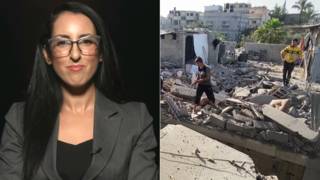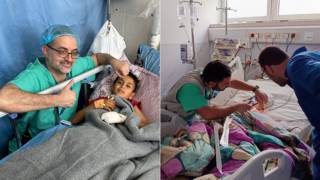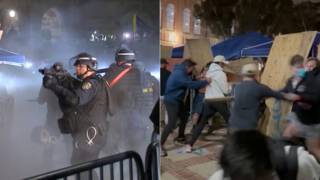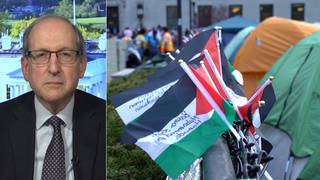
Related
Guests
- Sekou Odingaformer Black Panther who was a political prisoner for 33 years and was released in November 2014.
In Part 2 of Sekou Odinga’s first major broadcast interview, the former Black Panther and political prisoner discusses his 33 years behind bars, 15 Panthers still in prison and the Black Lives Matter movement.
This month marks the 50th anniversary of the founding of the Black Panther Party, and Odinga joined us along with three other former Panthers for a historic roundtable to discuss an overlooked part of its legacy.
Surviving Members of Angola 3 on Black Panther Legacy & Need to Free Remaining Imprisoned Panthers
Exclusive–Freed Panther Sekou Odinga on Joining the Panthers, COINTELPRO & Assata Shakur’s Escape
Political Prisoner Eddie Conway on Joining the Black Panthers & How He Was Set Up by COINTELPRO
Treat Them Like the Heroes They Are–Fmr. Black Panthers Call for Release of Those Still Locked Up
Web Special: 50 Years After Founding of Black Panther Party, Some Members Still Locked Up As Political Prisoners As the Black Panther Party marks its 50th anniversary, we revisit two decades of Democracy Now! interviews with members who were released from prison, in many cases after tortured confessions, wrongful convictions and long-term solitary confinement. We also report on those still behind bars.
Transcript
AMY GOODMAN: This is Democracy Now!, democracynow.org, The War and Peace Report. I’m Amy Goodman, with Juan González, as we bring you Part 2 of our conversation on this 50th anniversary of the founding of the Black Panther Party, looking at a much overlooked part of the legacy of the party: political prisoners in the United States who are former Black Panthers. Perhaps the most famous, Mumia Abu-Jamal, regularly interviewed on Democracy Now!, award-winning journalist, but there are a number of others. In fact, two former Black Panthers have already died in prison this year: Abdul Majid in New York and Mondo we Langa in Nebraska.
JUAN GONZÁLEZ: Well, for more, we’re joined by Sekou Odinga, former Black Panther, who was a political prisoner for 33 years and was released in November of 2014.
And as we continue our conversation, Sekou, could you talk about some of these prisoners, in particular, who have almost been—disappear from the public consciousness?
SEKOU ODINGA: Yes. If I may, let me just read the names of all 50 of them—15 of them. It won’t take me but a minute. Romaine “Chip” Fitzgerald in California, Ed Poindexter in Nebraska, Joseph Bowen in Pennsylvania, Jalil Muntaqim here in New York—all of them have been in prison since—Romaine Fitzgerald was in since ’69, the other ones was in from ’70 and ’71. You got Herman Bell imprisoned in New York in ’71; Russell Shoats in Pennsylvania, ’72; Sundiata Acoli, who is in prison since ’73; Veronza Bowers, in prison since ’73; Robert Seth Hayes, since ’73; Zulu Whitmore, in Louisiana, since ’77; Maliki Shakur, since ’79; Mumia, since ’82; Mutulu Shakur, since ’86; Imam Jamil Al-Amim, since 2000; and Kamau Sadiki, since 2002. And all of them have been locked up for—as you can see, for long periods of time.
And most of them have health problems. Kamau Sadiki is having some very, very bad, very serious health problems. So is Mumia Abu-Jamal. And Mutulu Shakur, he almost lost his leg, and he has a number of health problems.
And many of them have been denied parole for many—many times, you know, some of them for seven, eight, nine times. Jalil, six times he’s been to the board. Herman’s been to the board seven times.
AMY GOODMAN: To the parole board, you mean.
SEKOU ODINGA: To the parole board.
AMY GOODMAN: You knew Abdul Majid.
SEKOU ODINGA: I knew Abdul Majid very well. We grew up together in the same neighborhood. I went to school with his older brother. I was a couple of years older than Abdul Majid, but we started working together in the organization I mentioned to you earlier, the Grassroot Advisory Council. That was in—must have been in ’66. And so, from then, we worked very close together.
AMY GOODMAN: He died in prison after—just this past year.
SEKOU ODINGA: Just this past year, he did.
AMY GOODMAN: After how many years in prison?
SEKOU ODINGA: Thirty-three. Thirty-two or 33 years. It was almost 33, if it wasn’t 33. It was 33, yes.
JUAN GONZÁLEZ: I wanted to ask you about your own experience in prison and how you were treated by the guards and also by the other inmates, how the Panthers as political prisoners were regarded in the prisons.
SEKOU ODINGA: By the guards, it’s—some were very respectful of it. Some of them actually will tell you that if they were—if they were black and young and in the same situation, they would have been Panthers themselves. Others hated us. Some of them just absolutely had a just insane hatred for you, you know what I mean? Just the thought of you would just sent them crazy, you know. So, it was different. But generally speaking, by the other prisoners, it was—you always got respect. They all, even those who didn’t agree with your politics, respected your politics. So, with the other prisoners, it was always—it was always cool.
AMY GOODMAN: Were you able to organize inside?
SEKOU ODINGA: Always, always. You know, not—it was not very difficult, because many of—many people wanted to be organized. They were looking for something to get involved in, you know? And one thing I found that I always knew from my time as a youngster in jail was that young people are looking for information. They are looking—they want to learn. They come to you and ask you. You don’t really have to go and organize them. If you set up something for them to come, they’ll come. They want to learn. They ask you what can they read, what should they read. “Do you have anything I can read?” I mean, always, it was a—
AMY GOODMAN: What do you tell people to read?
SEKOU ODINGA: Many things, but I always tell them to read history. Always read your history. You have to know where you come from, so you know where you’re going. You know, without that, you’re lost. You don’t know who you are, if you don’t read, especially here in this country. We really don’t know who we are, if we don’t read our history.
JUAN GONZÁLEZ: And one of the things, in terms of the Panthers, that, again, most people are not aware of is that there were a lot of folks, like Eddie Conway, who came out of the military—I think Geronimo Pratt, as well as others—and immediately, from their experience in the military, decided that the Panthers was the organization they wanted to be in.
SEKOU ODINGA: Many did. Many, many, many of our members come out of the military. But, see, one of the things that we haven’t talked nothing about is the right to resist, the right to defend yourself. That’s a human right, and people all over the world recognize that human right. It has been legislated in all the international bodies, the right to struggle against oppressive regimes. That’s a right that people have. And so, we always talk about the brothers and sisters that have been illegally framed and locked up for things that they didn’t do, but we don’t give no real credit to those who was locked up for what they did do. They had a right to struggle. People don’t want to hear that. They don’t want to hear that you have the right to resist this oppressive system here, this oppressive government. The U.S. is an oppressive government, whether people want to hear it or not. Black people have been oppressed in this here—by this government since the entrance into this land. It’s just a—it is a fact of history.
JUAN GONZÁLEZ: And I wanted to ask you, in terms of that, the—you’re seeing now, of course, this whole wave of the Black Lives Matter movement, of young people again trying to highlight and resist police brutality and oppression. Your thoughts as you’re seeing this whole new generation, the pluses and the minuses of what they’re doing?
SEKOU ODINGA: I’m encouraged. I’m encouraged that, finally, they’re waking up. Finally, they’re saying, “I want to be involved.” I’m disappointed that they’re not organizing. They really don’t seem to want to—I mean, I’ve talked to a number of them, in leadership. They really are resisting organizing in their community to be able to bring about changes. And until they really organize themselves for certain goals, for—to bring about changes, there won’t be none.
AMY GOODMAN: What do you mean, “organize”? Because they would say people are organizing all over the country.
SEKOU ODINGA: No, they’re reacting. They’re reacting to—they’ll react to a killing. They’ll react to a brutality. They’ll run in the streets, and “No more! If you do it again, no justice, no peace!” And—but they don’t do nothing to make that a reality. You know, we organized. If you look, we had a program, a platform. This is what we—what we want. This is how we want to—this is why we want it. This is—then we went out and then created programs. We created programs to feed the children, when we said no hunger. We educated. We had liberation schools. We created health centers. We had sickle cell testing that had never been done. Now it’s all over this country. We did things to change the conditions of the people. If you don’t organize for that change, you won’t make that change. It ain’t gonna just happen because you say, “No justice, no peace!” you know, or “We want food” or “We want an end to police brutality.” None of that becomes a reality without organizing to make that a reality. So I’m saying that they have to organize. They have to organize. They have to organize. There’s just no way of getting around it.
AMY GOODMAN: You mentioned Geronimo. One of the Black Panthers who obtained evidence that he was a victim of law enforcement frame-up is Geronimo ji-Jaga Pratt. After he was convicted of the murder of a police officer, his defense team uncovered evidence that FBI agents may have known that Pratt was attending Panther meetings in Oakland on the day of the killing—this was decades ago—but concealed that knowledge. Government investigators acknowledged that the star prosecution witness against Geronimo, former Panther Julio Butler, was a paid informant for the FBI. During the original trial, Butler had claimed he had never been a law enforcement informant. This is an excerpt from a 1982 interview we did with Geronimo ji-Jaga Pratt from the archives of Pacifica Radio. It was conducted while he was in prison. He describes the role of the FBI informant in his conviction.
GERONIMO JI-JAGA PRATT: The main provocateur, the main element in my problems with the courts in—here in this country has been the FBI and their fear or their paranoia or their fascist tactics in trying to neutralize a movement that they didn’t like. Now, Julio Butler played a prominent role in that, in that he lied and said that he had knowledge of me in relation to this murder. He also lied on the stand that he never worked with the FBI, he never talked to anyone. And all these things have been pretty well publicized, now that we have documents of him reporting to the FBI almost on a daily basis. We have 33 actual documents which shows his contact with the FBI prior and up to and beyond the murder trial itself. So, the question comes up: Why did he lie? Or why did the FBI lie? Why did they lie about the surveillance records they had on me in Oakland? Why did they destroy the files that they had of me talking on the phone, telephonic surveillance? All these things didn’t come out in trial. We didn’t know about it.
AMY GOODMAN: That was Geronimo ji-Jaga Pratt speaking from prison in 1982. It’s in the Pacifica Radio Archive. Freed in 1997 after 26 years in prison, eight of those years in solitary confinement, he would go on to win a $4.5 million settlement against the city of Los Angeles and the L.A. police, as well as the FBI. How unusual was his case? And what did it mean to you, Sekou?
SEKOU ODINGA: It wasn’t that unusual. I think what was unusual was the—the winning of monetary—
JUAN GONZÁLEZ: Damages.
SEKOU ODINGA: —damages after the fact. But—
AMY GOODMAN: And uncovering all that evidence.
SEKOU ODINGA: Well, there’s a lot of us have uncovered evidence. But, yes, I guess that was unusual. But before he did it, Dhoruba bin Wahad had did it, you know? And if you remember, in Chicago, after the murder of Fred Hampton, they uncovered a whole lot of information. In fact, they started the ball rolling, really.
AMY GOODMAN: Black Panther leader Fred Hampton and Mark Clark in 1969, murdered by the Chicago police.
SEKOU ODINGA: Yeah, so, in terms of him being framed, that was not unusual. It was pretty regular. Like—what’s his name?—Conway was saying—
AMY GOODMAN: Eddie Conway.
SEKOU ODINGA: Eddie, yeah, that he had been framed. And many others have been framed. Assata Shakur was framed. They clearly knew she wasn’t—she didn’t murder nobody. Her hand—I mean, it showed that the bullet went into her arm and come up through it, so her hands had to be up for that to happen. If she was shooting, it couldn’t—it would hit her here or somewhere, you know? So, it’s been clear that they have been framing us for many, many years. That was not nothing new. What was different, probably, was that he was able to prove it, and the media publicized it. And, you know, usually, even when we do win a case, we don’t hear about it.
AMY GOODMAN: What does the term “political prisoner” mean to you?
SEKOU ODINGA: It means someone who has been arrested for their political beliefs or their political activities or support of those politics. We have not talked much about a political prisoner of war, which many of us have claimed that status, because there is a war going on. We believe—we know that the United States government has declared war against black, quote-unquote, “radicals,” you know, to make sure that they don’t influence, their influence is wiped out in the black community. And so, there are political—people who claim political prisoner of war status, like Abdul Majid, for instance, people who was caught up into the situation where they were accused of being part of the war effort. They were accused of being members of the Black Liberation Army, you know, soldiers of the Black Liberation Army, even though they’ll say that they were members of the—soldiers of the Black Liberation Army, but then they’ll turn around and say they wasn’t political, that it was all criminal, you know? So, it’s—but clearly, there is some differences. And the difference is the war effort and just the political effort.
AMY GOODMAN: Finally, how has it been for you to come out? It’s been two years. How have you adapted? What is it like to go home to Brooklyn? And what kind of organizing are you involved with?
SEKOU ODINGA: It’s been difficult. It’s been very difficult. It’s still difficult. It’s, you know—at my age—I’m 72 years old. I was 70 years when I come home. Finding a job is almost impossible. And just reconnecting to society, becoming a part of it again—I heard Brother Eddie say—no—
AMY GOODMAN: Albert?
SEKOU ODINGA: Albert said how fast things are moving. Everything is speeding, you know? Everything. I mean, just trying to catch up, you know?
JUAN GONZÁLEZ: We were talking in the break about the neighborhoods have changed in Brooklyn.
SEKOU ODINGA: Yeah, how things have changed. Yeah, you look at—and every—we were talking about Fort Greene, but all through Brooklyn, all through Queens, places I’ve lived—I went out to Queens. I was born and raised in Queens. I didn’t know it. If someone had dropped me into where—in the middle of Queens, and I opened my eyes and seen myself in Queens, I wouldn’t have knew where I was at. It was—streets are different. The names on the streets are different. One-way streets used to be two-way streets. It’s crazy, all the building that’s gone on, and it’s going on today, you know? The black neighborhoods are turned into white neighborhoods. I mean, it’s crazy.
AMY GOODMAN: So what advice do you have for people coming out of prison, how to adjust?
SEKOU ODINGA: Take time. Take your time. If you’re blessed—see, I was blessed. I have a supportive family and a very supportive wife. So, I didn’t have to get right—I didn’t have to get right out there and get a job and go to work. If you got a minute, even if you have to get right out there and work, then—but just go to work and come home and take your time, you know? Check things out. You know, walk. I mean, I found just walking through the neighborhoods to kind of get accustomed to it and kind of get the feel of people being around you, without you having to turn and watch your back as they go past you—you know what I mean? In jail, if—in some of the prisons, because most of us have been in the worst prisons. They put us in the worst prisons. So you’re always watching your back. You’re always—you’ve got to kind of get comfortable. I hated the movies, when I got—come home, you know? I don’t see that well, so I didn’t want to sit way in the back, but when I’m sitting in the front, I’ve got to keep looking over my shoulder. Who’s that behind me, you know? So, it’s something. Adjusting is something. And then, making a living is very difficult. You know, I’ve been able to do a little speaking in a number of the schools around the country that have invited me to speak, and they pay me a little honorarium. So that’s how I’ve made a little money to kind of buy some rags, you know, and not have to beg the wife to put some money in my pocket. But it’s difficult. It’s very difficult.
AMY GOODMAN: Well, Sekou Odinga, we want to thank you very much for being with us, former Black Panther, in prison for 33 years, was released in November of 2014. I’m Amy Goodman, with Juan González. Thanks so much for joining us. To see Part 1 of our conversation with not only Sekou Odinga, but Eddie Conway, Albert Woodfox, Robert King, go to democracynow.org, on this 50th anniversary of the founding of the Black Panther Party. Thanks.












Media Options